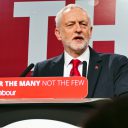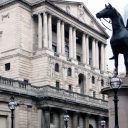Where does money come from, and why does it matter?

Picture by Joe Giddens PA Wire/PA Images to an official report.
We are all familiar with money: it is something we own, which can be exchanged for other things that are up for sale. Money is a social construct; a means of exchange that can allow us to draw comparisons in value between things as different as pints of milk and packets of nails. But money, of course, must be something more than simply an abstract idea if it is going to work in practice. Most people are aware that money has ‘been’ many different things in different places: gold, silver, beads, stones with holes in them, etc. What is money in our globalized world of today?
Again, the answer is familiar. Money is either numbers in bank accounts, or notes and coins. These numbers, notes and coins belong to us until we spend them. But what kind of property are they? Not many people know it, but legally, what these numbers, coins and paper represent is debt from a bank. When we own money, we own debt from a bank. (If you want to know more, the Bank of England’s report on Money Creation is worth reading.)
In everyday life, we can see this in the tiny words still written on bank-notes: ‘I promise to pay the bearer on demand the sum of … pounds’. A century ago, the bank would pay gold. Today, gold has been written out of the picture and ‘what the banks owe us’ is a legal fiction. Try turning up at your high-street bank and demand: “pay me what you owe me!”, you will get a funny look. If the teller gets your drift, you may be given cash, which is itself more debt or ‘promises to pay’, this time from the central bank.
There are many fictions in law, and each is created and kept going for a purpose. In this case, the purpose is quite clear: to advantage the rich and powerful at the expense of productive working people. The original justification for this advantage was that it was necessary and desirable for the purposes of making war and building empires. It also helped enrich governments, financial speculators and (almost incidentally) bankers.
The fact that money is now debt from banks makes it different from other simple forms of money such as gold, silver, stones-with-holes, bitcoin etc. These differences allow certain evils in our world – such as inequality, debt, corruption, arms production and war – to become much greater than they otherwise would be. The object of this article is to outline some of the connections between the way money is created and our increasingly desperate and crooked human world. But first, a few more remarks on how we got to the situation in the first place.
How did debt from a bank become money?When money was gold, a bank would accept a deposit of gold from customer X and give X a note saying, ‘we owe you gold.’ X would pass the paper to Y in payment for something, and the bank would now owe Y the gold. Y was now legal owner of the debt of gold. During this process, no gold would be shifted or moved. Whoever owned the note could, however, go to the bank and demand the gold.
A change in the law.
Before bank-money could, like a cuckoo’s child, begin to nudge all other forms of money out of the nest, a momentous change in the law was needed. Debt had to become something that X could legally pass on to Y. Otherwise, when Y came to ask for the gold that X had deposited, the bank could tell Y to get lost.
As far as modernity is concerned, this change in law was first made in the English Parliament between the years 1694 and 1704, at a time when Parliament consisted of rich men voted in by other rich men. After that, country by country, copy-cat laws were adopted. Globalization has completed the process more-or-less worldwide.
Consequences of the new laws.The first consequence of debt becoming ‘negotiable’ was that value could be created out of nothing, simply by two parties creating equal-and-opposite debts. Each party would own a valuable entity – the debt of the other. The difference is obvious today when considering the difference between a private loan between friends, and large-scale lendings-and-borrowings.
If I lend money to a friend, I no longer have that money until (perhaps) one day I get it back. No new money has been created. If, on the other hand, I lend money to a government or a corporation, I get a ‘bond’ in return – a piece of paper which can be bought and sold, and which is as valuable as the money I am lending. I can buy things with it: it is a form of money which circulates only among the wealthy. The sacred text of economics, The Wealth of Nations puts it simply: ‘The merchant or monied man makes money by lending money to government, and instead of diminishing, increases his trading capital.’ (Book 5, Chapter 3). ‘Negotiable debt’ is the essence not only of national and corporate debts, but also of banking.
Bank-money: The moment of creation.Now that gold is out of the picture (the last vestiges of the ‘gold standard’ were formally abandoned in 1976) governments supply ‘reserve’ digits which take its place. These digits maintain the system working in the same way it has for several centuries – but without the inconvenience of having to keep large stores of genuine value, and without the restraint which a possible demand for gold put upon the amount of money that could be created.
Today, banks create money out of nothing, by creating two equal-and-opposite debts. The bank owes the borrower, the borrower owes the bank. What the bank owes becomes money. Governments supply reserve upon demand.
At the point, another ‘magic trick’ of banking occurs. The interest payments go one way – to the bank. Because what the bank owes is money, it can charge interest on its own debt – like water travelling uphill.
Historically, via banking and negotiable debt, the old feudal world, in which laws were made for men good at hacking each other to pieces, was replaced by a new ruling class of ‘moneyed men’. Our so-called ‘democracy’ has not yet produced a new and democratic world – nor a reduction in killing each other. Instead, certain truths that used to be familiar have gone underground, beneath the radar of public debate.
Special characteristics.And so to the question: ‘What are the special characteristics of bank-created money?’ Some of these have been mentioned already.
- Banks find themselves in the enviable position of charging interest on what they owe: today, that is all the money in existence.
- New money is created by private agreement between two parties – bank and borrower – when both expect to make a profit on the newly-created money.
- When loans are repaid, the bank’s fictional debt disappears. Money is destroyed. This means that once profits have been taken, new money can again be created without (necessarily) increasing the money supply.
- All monetary value consists of the debt of others, so the system is inherently unstable. Finance is a world of interlinked debts: when many debts begin to look bad, the system teeters.
- The ‘debt’ and ‘value’ elements of the created money separate when payments are made. It is the job of virtuoso operators to end up with the value, and leave others holding the debt.
- When times are good, lots of money gets created because everyone sees a profit in borrowing; when times are bad, very little gets created.
So: how do these special characteristics feed the acknowledged evils of our world – things like war, poverty, unemployment, inequality, corruption, and destruction of the environment? Some of the connections are obvious, some less so. I will outline a few.
Inequality is a pretty obvious one. As I mentioned earlier, a bank creates new money to profit itself and the borrower. The bank profits from interest payments. Borrowers use the new money to purchase things: businesses, capital assets, luxuries, investments. They enjoy rises in asset prices, and rents from their new assets.
Inequality leads to sick economies.Economies may suffer from many different maladies. The one that recurs again and again is economic engorgement, when most wealth is situated with a few people, and spending on consumables dries up. Picture a café where the customers have a lot of money between them, but all of it is sitting in the pocket of one person. Not many cups of coffee will be sold. When spending dries up, profits dry up, and rich people will lose money too – unless governments supply them with more via practices like ‘quantitative easing’.
Booms and busts.The instability of a debt-based money system has been noted already. Extreme cycles of prosperity and recession are inevitable when banks create the money supply. Due to what economists have called the ‘perverse elasticity’ of bank-created money, banks create too much money in the good times, and not enough in bad times.
Debt, national and personal.Booms and busts are exploited by financial speculators. Large amounts are lent when borrowers are confident they will profit eventually. When the worm turns, credit is called in. Revenues dry up; borrowers can’t pay; assets are seized. Greece today is a stark national example. People losing their homes after mortgage defaults are painful personal examples.
Unemployment: Growing debt makes for an uncompetitive workforce.Interest on debt, both national debt and personal, must be paid for by the production of working people: workers must earn more before they’ve anything to spend. Workers in countries with high levels of debt become more expensive; jobs are outsourced to where debt is less, and labour is cheaper.
Corporations are hobbled by bank-created debt: Industry goes abroad.Banks create money for speculators to replace equity with debt. Share prices are inflated and speculators take profits. Corporations hobbled by fixed-interest, fixed-value debt are less adaptable to changing circumstances than corporations owned by shareholders.
Arms proliferation.Banks feed a vicious circle between arms production and purchase, eagerly creating new money for both buyers and sellers. Banks create money for governments to acquire arms: with demand guaranteed, they willingly create money for manufacturers too.
War.War is massively destructive, and yet banking in England was instituted and made legal for the precise purpose of enabling war. Governments need to borrow for war, and the way money is created makes borrowing easy and unaccountable – an important point, for what truly democratic nation would vote to indebt itself for purposes of destruction and slaughter? In addition, during war governments manufacture money for people – soldiers, armaments workers – who spend. This relieves the condition of ‘engorgement’ referred to above.
An inbuilt need for economic growth.A steady-state economy is inconceivable when the money supply takes from most and gives to a few; soon, most money sits waiting for investment, and spending dries up. In these circumstances, growth is necessary just to keep the economy going: growth means that money which would otherwise sit idle pours into new factories, new employment – and into the pockets of workers who will spend it.
Nature and environments destroyed.When the system itself demands relentless growth, resources and environments are relentlessly plundered and destroyed. ‘Built-in obsolescence’ replaces ‘built-to-last’.
Monopolistic concentrations of power.Money created on prospect of profit enables already-large organizations to borrow huge quantities to purchase rivals, or to bankrupt them by practices like pricing below cost for extended periods of time (Uber being a current example: ).
Populations in servitude.Extreme inequality means greater dependency for most people upon powers with money – governments and commercial corporations. Governments redistribute wealth to some extent, but those ‘with’ do not like to see too much going to those ‘without’.
Predatory finance: Whole countries looted.Nations with strong banking sectors generate money out of nothing and purchase assets in foreign countries. In this respect, nations behave like banks, exporting debt they hope they will never have to pay. Weaker nations get poverty and corrupt governments, which suppress dissent and act as predatory kleptocrats. Dispossessed citizens emigrate, in search of peace and a living, to countries which have contributed to their ruin. They often get a brutish reception.
Secondary corruptions.In circumstances outlined above, democracy becomes plutocracy, ‘economics’ becomes a propaganda machine, and mainstream media organizations owned by states and corporations, leave a lot unsaid. The standard narrative of capitalism – ‘savers lend to borrowers’ – also becomes a fiction, as savings are dwarfed by newly-created money.
Extremist politics.An important outcome of the corruptions listed above is the drift to extremist politics. Workers know they are being cheated out of freedoms and the rudiments of a decent life, but do not understand how. Monstrous escapees from some medieval vision of hell – people like Vladimir Putin and Donald Trump – sense their opportunity and offer themselves as remedies. The true remedy – reform – is lost, submerged beneath the radar of public debate. Straightforward corruption in politics.
Money manufactured secretly by banks makes transparency in public affairs difficult if not impossible. A blunt illustration: many Russian oligarchs have their own banks, manufacturing money for (among other things) bribes. A bribe may be a very profitable investment – even a necessity in many countries, for someone who wants to climb to great wealth.
Robbing the public purse.In many countries, robbing the public purse is routine. Bank-created money makes this easy. Government officials take out loans, relocate the money and default on the loan. The bank will be out of pocket; but friends in government put public money towards shoring up the bank. The judicial system may be in on the racket too, turning a blind eye.
Some examples are currently in the newspapers: In Bangladesh, ‘some $565 million in assets are said to have been looted from the state-owned BASIC Bank between 2009 and 2012, yet the scam’s suspected mastermind, a former chairman of the bank, wasn’t troubled by the anti-corruption commission investigating the fraud, reportedly thanks to his political connections.’ In Malaysia, a ‘billion-dollar political scandal’ involves two brothers, a banker and the Prime Minister. In Moldova, a large proportion of the wealth of the country has been looted and relocated with financial partners, mostly in Russia.
Power in the wrong hands.Despite the cultural myths of our age, most people do not want to give their lives over to getting more ad infinitum. They want enough to live well, in return for work they can be proud of. Our system of money-creation favours individuals for whom ‘getting more’ overrides all other considerations. The consequences of power residing in the wrong hands is incalculable – and perhaps most significant of all the effects of banks creating money.
Possibilities post-reform.The way our money-supply is created contributes to many evils. Without this contributing factor, what would the world look like? No doubt the evils would continue in lesser degree. But the world would have a chance to climb out of present reality, when so much good, real and potential, seems on the point of being overwhelmed. Reform would not be difficult; the problem is, as ever, a problem of political will.






